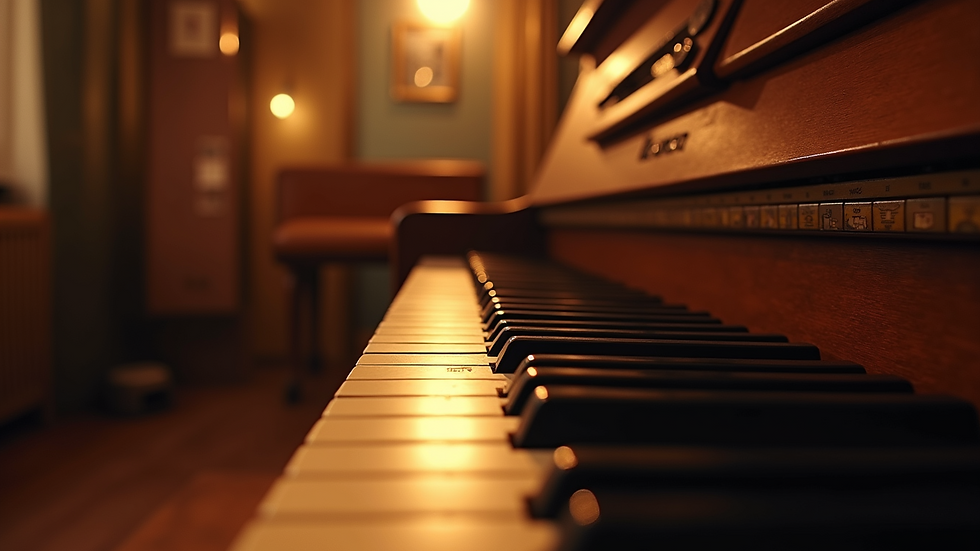The Role of Music Composition in Film and Television
- Bridgewater Publishing Company

- Jul 11
- 3 min read

Music plays a vital role in shaping the emotional and narrative impact of film and television. Whether it’s a haunting string motif or an uplifting jazz score, the right composition elevates visuals and brings stories to life. For decades, composers have worked behind the scenes to create sonic experiences that guide the audience’s feelings, highlight character moments, and underscore tension or joy. In this article, we explore how music composition for film and television works, the techniques used by professional composers, and why the craft remains essential in today’s content-driven media landscape.
Why Music Composition Matters in Film and TV
Music isn’t just a background element—it is storytelling in audio form. A well-composed score enhances the drama, provides emotional cues, and often becomes iconic in its own right. Think of the suspenseful notes in a thriller, the whimsical jazz of a romantic comedy, or the somber chords during a tragedy. Music guides the audience subconsciously, creating atmosphere and emotional resonance.
The Film Composer’s Process
Composing music for screen involves collaboration, technical precision, and emotional sensitivity. A typical process includes:
Spotting Session: The composer and director decide where music should appear.
Theme Development: Central motifs or themes are written to represent characters or emotions.
Scoring: Music is written to synchronize with scene timing, pacing, and dialogue.
Recording & Production: Musicians perform the score, which is then edited and mixed for the final cut.
Jazz composers are especially valued for scoring due to their improvisational skill and versatility across moods and tempos.
The Difference Between Score and Soundtrack
Score: Original music written specifically for a production.
Soundtrack: A collection of existing songs or music used within the production.
Both play important roles, but original scoring allows for precise emotional control and creative expression tailored to the story.
Jazz in Film and Television
Jazz has a long history in cinema and television, especially in noir films, detective stories, and introspective dramas. Its fluid rhythms and emotional range make it ideal for improvisational or character-driven moments. Bridgewater Publishing Company has supported composers in creating jazz scores that fit both traditional and modern screen narratives.
Tips for Aspiring Film Composers
Study Screen Structure: Understand narrative arcs and how music supports them.
Practice Syncing to Visuals: Compose while watching scenes to perfect timing.
Master MIDI and Notation Software: Tools like Logic Pro, Sibelius, and Finale are essential.
Work on Short Films and Indie Projects: Gain experience before moving to larger productions.
Build a Reel: Showcase your work to producers and directors.
FAQs
What is the role of a music composer in film?
A music composer creates original music to accompany visual media, enhancing emotional and narrative elements.
Is composing for television different from film?
Yes. TV compositions often require faster turnarounds and may include shorter, repeatable cues or themes.
What type of music is best for scoring?
It depends on the genre and tone. Jazz, orchestral, electronic, and hybrid scores are all commonly used depending on the project’s needs.
Do composers work with directors?
Yes. Collaboration with directors, producers, and editors is essential to ensure the music aligns with the story and visual tone.
Can jazz music be used in film scores?
Absolutely. Jazz brings a rich emotional palette and works especially well in character-driven or period pieces.
Contact us
Are you producing a film or television project and need a custom score that captures your vision? Bridgewater Publishing Company offers professional music composition services, with a strong background in jazz and cinematic scoring. Contact us today to bring your story to life with original, emotionally powerful music.




Musicians, students, and teachers often need blank staff paper for composing or exercises. Instead of buying manuscript books, you can find high-quality, free printable StaffPaper online. It’s very convenient for quickly getting the notation sheets you need.